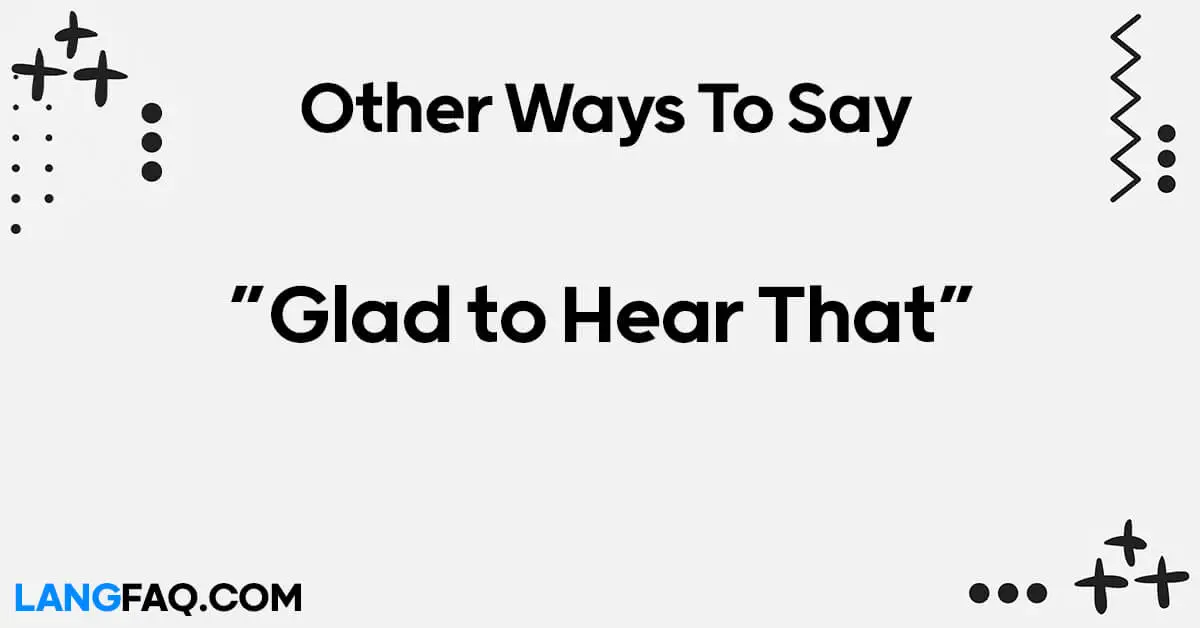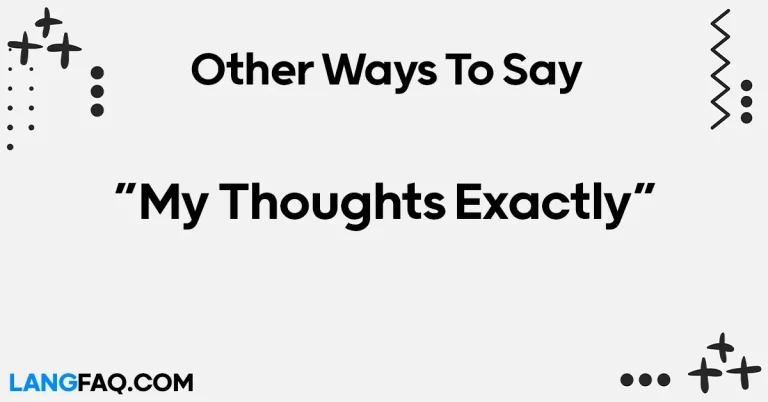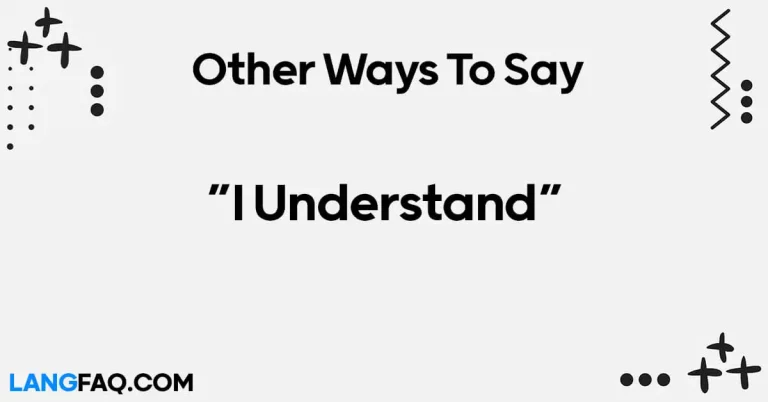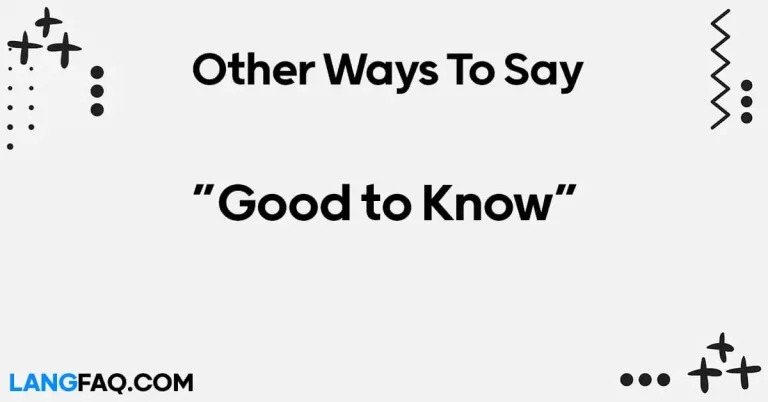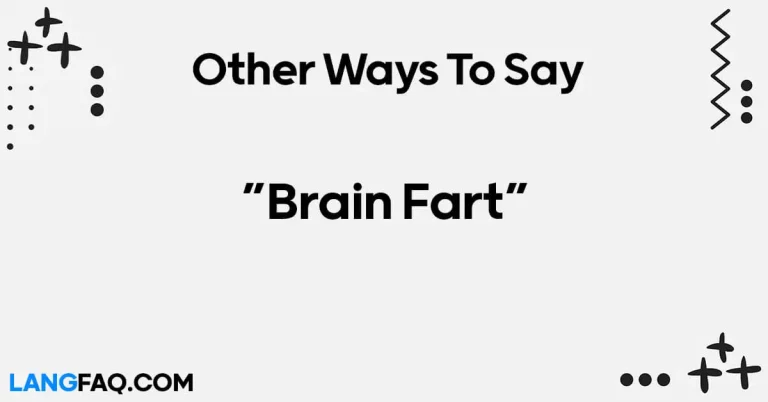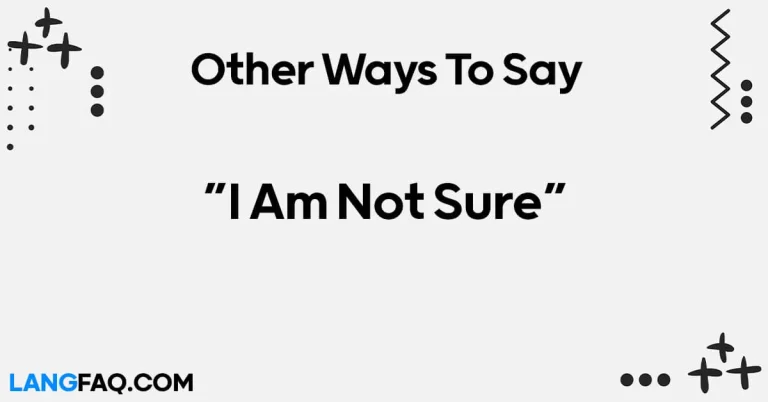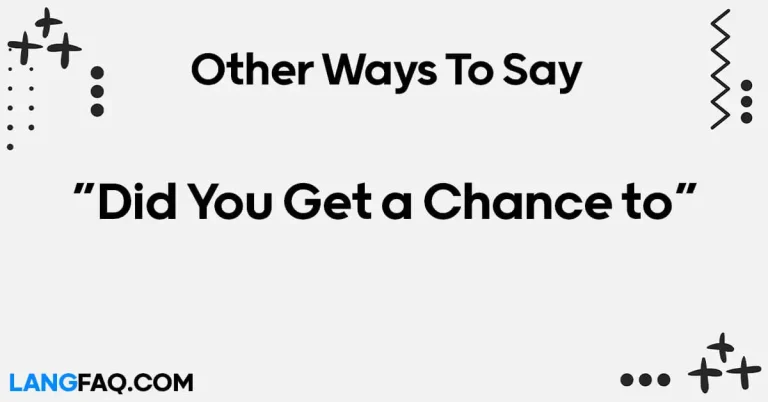Welcome to a linguistic journey where we explore diverse ways to express happiness and acknowledgment. Whether you’re tired of using the same phrase or simply aiming to broaden your vocabulary, this guide will provide you with 12 refreshing alternatives for “Glad to Hear That.” Let’s dive into the richness of language and discover exciting new ways to convey joy and enthusiasm.
12 Other Ways to Say “Glad to Hear That”
Here are 12 alternative ways to express “Glad to Hear That”:
- Delighted to Learn That
- Thrilled at the News
- Pleased to Hear It
- Ecstatic about the Update
- Overjoyed with the Information
- Elated to Know
- Excited by the Announcement
- Rejoicing in the Good News
- Enthused to Hear That
- Pleasantly Surprised
- Cheered by the Update
- Smiling at the News
Here’s a table with meanings and examples for the 12 alternative ways to say “Glad to Hear That”:
| Expression | Meaning | Example |
|---|---|---|
| Delighted to Learn That | Extremely pleased or happy to receive news | “I’m truly delighted to learn that you got the job!” |
| Thrilled at the News | Excited and elated by the received information | “She was thrilled at the news of her promotion.” |
| Pleased to Hear It | Happy and content upon hearing the news | “I’m so pleased to hear that you’re coming to visit.” |
| Ecstatic about the Update | Overwhelmingly joyful regarding the update | “He was ecstatic about the positive project update.” |
| Overjoyed with the Information | Experiencing immense happiness with the provided details | “They were overjoyed with the information shared.” |
| Elated to Know | Extremely happy to be informed about something | “She was elated to know that her book was published.” |
| Excited by the Announcement | Feeling enthusiasm and joy due to the announcement | “We were excited by the announcement of the upcoming event.” |
| Rejoicing in the Good News | Celebrating and expressing joy in positive news | “The entire family is rejoicing in the good news of the new arrival.” |
| Enthused to Hear That | Filled with eagerness and excitement upon hearing | “I’m enthused to hear that you’ll be joining our team.” |
| Pleasantly Surprised | Positively shocked and happy about the surprise | “I was pleasantly surprised to receive your thoughtful gift.” |
| Cheered by the Update | Feeling uplifted and happy due to the received update | “We were all cheered by the positive project update.” |
| Smiling at the News | Expressing joy and happiness with a smile | “She couldn’t stop smiling at the news of their engagement.” |
These alternative expressions for “Glad to Hear That” offer a rich tapestry of emotions, allowing you to convey your happiness with nuance and variety. Whether you’re delighted, thrilled, or pleasantly surprised, each phrase brings its unique flavor to the expression of joy and acknowledgment. Experiment with these alternatives to make your responses more vibrant and engaging.
Is It Correct to Say “Glad to Hear That”?
Absolutely! “Glad to Hear That” is a common and correct expression used to convey happiness or satisfaction upon receiving positive or pleasant news. It’s a versatile phrase suitable for various situations, both formal and informal.
When and Where to Use
- Formal Settings: In professional emails, during business meetings, or in official communications where a positive response is required.
- Example: “Dear [Recipient], I am glad to hear that the project is progressing well.”
- Informal Conversations: Among friends, family, or colleagues, expressing joy or happiness in a casual manner.
- Example: “Hey, I heard you got the promotion! Glad to hear that!”
Grammar and Usage
- This phrase is grammatically correct and widely accepted in both spoken and written English.
- It is commonly used as a standalone expression or as part of a larger sentence.
Tips for Effective Use
- Ensure that your tone matches the context. Adjust the level of formality based on the relationship with the recipient.
- Consider adding specific details to show genuine interest and engagement.
Pros and Cons
- Pros: Simple, universally understood, and suitable for various contexts.
- Cons: May be perceived as slightly generic; consider using more diverse expressions for added impact.
Dictionary Insights
Cambridge Dictionary defines “glad” as feeling pleased and happy about something. Combining it with “hear that” emphasizes the joy in response to received information.
Professional Mail Example With “Glad to Hear That”
Subject: Positive Progress Report on Project XYZ
Dear [Recipient’s Name],
I trust this email finds you well. I wanted to take a moment to share some positive updates regarding Project XYZ. After careful analysis and dedicated efforts from the team, I am glad to hear that we have achieved significant milestones ahead of schedule.
The successful completion of [specific task] and [another specific achievement] reflects our collective commitment to excellence. Your leadership and the hard work of the entire team have truly made a difference.
I am particularly glad to hear that the client feedback has been overwhelmingly positive. It is a testament to our dedication to delivering high-quality results that exceed expectations. Your meticulous attention to detail and strategic approach have undoubtedly played a crucial role in this success.
Moving forward, I believe that building upon these accomplishments will pave the way for even greater achievements. I am eager to discuss our next steps during our upcoming team meeting scheduled for [date and time].
Once again, thank you for your unwavering commitment to excellence. I look forward to celebrating more successes together.
Best Regards,
[Your Full Name] [Your Position] [Your Company]
Delighted to Learn That
Expressing extreme joy and satisfaction, “Delighted to Learn That” adds a touch of elegance to your acknowledgment. This phrase is ideal for both formal and informal contexts, conveying genuine happiness in a sophisticated manner.
Formal Context: In a professional setting, use this phrase to convey your delight in a refined way. For instance, when a colleague shares positive project outcomes, respond with, “I am truly delighted to learn that the project exceeded our expectations. Your efforts are commendable.”
Informal Context: In more casual settings, such as personal relationships, this phrase adds a warm and appreciative tone. For example, when a friend shares exciting personal news, respond with, “I’m absolutely delighted to learn that you’re getting married! When’s the big day?”
Variations:
- Delighted to Hear That
- Delighted about the News
Example Sentence: “I was truly delighted to learn that my proposal was accepted, marking a significant achievement in my career.”
Email Sample:
Subject: Delighted to Share Exciting News
Dear [Recipient’s Name],
I hope this email finds you well. I am delighted to learn that our proposal has been accepted by the client. Your dedication and hard work made this success possible, and I look forward to celebrating together.
Best regards, [Your Name]
Thrilled at the News
When your excitement knows no bounds, “Thrilled at the News” is the perfect phrase to convey intense joy. Whether in a professional or personal context, this expression adds a vibrant touch to your response.
Formal Context: In a professional environment, use this phrase to showcase enthusiasm for positive developments. For instance, when informed about a successful business deal, respond with, “We are thrilled at the news of closing the deal. It’s a significant milestone for our company.”
Informal Context: In personal interactions, especially among friends or family, this phrase injects energy into your response. For example, if a friend shares upcoming travel plans, reply with, “I’m thrilled at the news! Can’t wait to hear all about your adventures.”
Variations:
- Thrilled to Hear It
- Thrilled Beyond Words
Example Sentence: “She was thrilled at the news of being selected for the leadership program, a recognition of her dedication and skills.”
Email Sample:
Subject: Thrilled to Share Exciting News
Dear [Recipient’s Name],
I am thrilled to share the exciting news that our team’s hard work has paid off, and we secured the project. This success belongs to each one of you. Let’s celebrate our achievement!
Best regards, [Your Name]
Pleased to Hear It
For a more understated yet heartfelt response, “Pleased to Hear It” is a versatile phrase suitable for various contexts. It conveys satisfaction and contentment, making it suitable for both formal and informal situations.
Formal Context: In professional communication, use this phrase to express satisfaction without overwhelming enthusiasm. For instance, when a colleague shares progress on a task, respond with, “I’m pleased to hear it. Your dedication to this project is evident.”
Informal Context: In personal interactions, this phrase adds a touch of warmth without being overly formal. For example, when a friend shares good news, reply with, “I’m so pleased to hear it! Your happiness means a lot to me.”
Variations:
- Pleased to Know
- Very Pleased to Hear That
Example Sentence: “After a challenging period, I was genuinely pleased to hear that the team had successfully overcome obstacles and achieved their goals.”
Email Sample:
Subject: Pleased to Share Positive Updates
Dear [Recipient’s Name],
I wanted to share some positive updates with you. I’m pleased to hear that our recent marketing campaign has yielded excellent results. Your input was invaluable.
Best regards, [Your Name]
Ecstatic about the Update
When you want to convey overwhelming joy and excitement, “Ecstatic about the Update” is the phrase to use. This expression is suitable for both formal and informal situations where exuberance is appropriate.
Formal Context: In professional settings, use this phrase to convey intense joy regarding positive developments. For example, when informed of a successful product launch, respond with, “We are ecstatic about the update. It’s a game-changer for our brand.”
Informal Context: In personal interactions, especially among close friends or family, this phrase communicates uncontainable joy. For instance, if a friend shares news of a new job, reply with, “I’m absolutely ecstatic about the update! This is fantastic news.”
Variations:
- Ecstatic to Hear That
- Completely Ecstatic
Example Sentence: “The team was ecstatic about the update on securing a major client, signaling growth and recognition for their hard work.”
Email Sample:
Subject: Ecstatic to Share Exciting News
Dear [Recipient’s Name],
I couldn’t wait to share the exciting news with you. We are ecstatic about the update – our project received exceptional feedback from the client. Your contributions were key to this success.
Best regards, [Your Name]
Overjoyed with the Information
When you want to express abundant joy and happiness, “Overjoyed with the Information” is a powerful phrase. It conveys a sense of immense satisfaction and can be used in various contexts.
Formal Context: In professional communication, use this phrase to communicate profound happiness without losing professionalism. For example, when informed of positive financial results, respond with, “We are overjoyed with the information. It’s a testament to the team’s hard work.”
Informal Context: In personal interactions, this phrase adds a personal touch to your response. For instance, if a family member shares good news, reply with, “I’m overjoyed with the information! Your achievements bring joy to us all.”
Variations:
- Overjoyed to Hear That
- Overjoyed by the News
Example Sentence: “The staff was overjoyed with the information that the company had been nominated for a prestigious industry award.”
Email Sample:
Subject: Overjoyed to Share Exciting News
Dear [Recipient’s Name],
I am overjoyed to share the exciting news with you. Our project has been selected for recognition, and this achievement belongs to each member of our dedicated team.
Best regards, [Your Name]
Elated to Know
“Elated to Know” conveys a state of elevated happiness and satisfaction. This phrase is suitable for both formal and informal contexts, allowing you to express intense joy with sophistication.
Formal Context: In professional settings, use this phrase to communicate heightened joy without being overly casual. For example, when informed of positive client feedback, respond with, “We are elated to know that our client is highly satisfied with our services.”
Informal Context: In personal interactions, especially in moments of personal achievement, this phrase adds a touch of class to your response. For instance, when a friend shares news of their academic success, reply with, “I’m genuinely elated to know about your accomplishments!”
Variations:
- Elated to Hear That
- Truly Elated
Example Sentence: “The team was elated to know that their innovative project had received recognition from industry experts.”
Email Sample:
Subject: Elated to Share Wonderful News
Dear [Recipient’s Name],
I am elated to share wonderful news with you. Our collaborative efforts have resulted in remarkable success, and your contributions have been pivotal. Let’s celebrate this achievement together!
Best regards, [Your Name]
Excited by the Announcement
Expressing enthusiasm and positive anticipation, “Excited by the Announcement” is a dynamic phrase suitable for various contexts. It conveys a sense of energy and eagerness in response to positive news.
Formal Context: In professional settings, use this phrase to add dynamism to your acknowledgment. For instance, when informed of an upcoming company event, respond with, “We are excited by the announcement and look forward to the event’s success.”
Informal Context: In personal interactions, especially among friends, this phrase communicates genuine excitement. For example, when a friend shares news of an upcoming trip, reply with, “I’m so excited by the announcement! Where are you planning to go?”
Variations:
- Excited to Hear It
- Truly Excited
Example Sentence: “The team was excited by the announcement of a new project, bringing fresh challenges and opportunities for growth.”
Email Sample:
Subject: Excited to Share Great News
Dear [Recipient’s Name],
I am excited to share some great news with you. The recent announcement regarding our expansion plans opens up new possibilities for our team. Your insights will be valuable in this exciting journey.
Best regards, [Your Name]
Rejoicing in the Good News
When you want to convey a sense of celebration and happiness, “Rejoicing in the Good News” is a phrase that captures the spirit of joy. It’s versatile and can be used in both formal and informal situations.
Formal Context: In professional communication, use this phrase to express collective joy within a team or organization. For example, when informed of a successful product launch, respond with, “We are rejoicing in the good news. Congratulations to the entire team!”
Informal Context: In personal interactions, especially among close-knit groups, this phrase adds a communal touch. For instance, when a friend shares news of their engagement, reply with, “We’re all rejoicing in the good news! When’s the celebration?”
Variations:
- Rejoicing at the News
- Rejoicing Together
Example Sentence: “The staff was rejoicing in the good news of surpassing quarterly targets, reflecting a collective effort and dedication.”
Email Sample:
Subject: Rejoicing Together in Our Success
Dear [Recipient’s Name],
I am thrilled to inform you that our recent initiative has been a tremendous success. We are all rejoicing in the good news, and your individual contributions have played a vital role.
Best regards, [Your Name]
Enthused to Hear That
Combining enthusiasm with genuine pleasure, “Enthused to Hear That” is a dynamic phrase suitable for expressing energetic joy. It can be used in various contexts to convey both excitement and appreciation.
Formal Context: In professional settings, use this phrase to communicate a high level of excitement. For instance, when informed of positive customer feedback, respond with, “We are truly enthused to hear that our clients are delighted with our services.”
Informal Context: In personal interactions, especially among friends, this phrase adds an energetic touch. For example, when a friend shares news of a new project, reply with, “I’m so enthused to hear that! Your passion for this project is contagious.”
Variations:
- Enthused About It
- Enthused Beyond Words
Example Sentence: “The team was enthused to hear that their community outreach program had a significant positive impact, creating a sense of fulfillment.”
Email Sample:
Subject: Enthused to Share Positive Feedback
Dear [Recipient’s Name],
I am enthused to share positive feedback we received from our recent initiative. Your dedication and hard work have contributed immensely to this success.
Best regards, [Your Name]
Pleasantly Surprised
When you want to convey joy with an element of unexpected delight, “Pleasantly Surprised” is the ideal phrase. It adds a positive twist to your acknowledgment and can be used in various settings.
Formal Context: In professional communication, use this phrase to express unexpected positive outcomes. For example, when informed of a successful client pitch, respond with, “We are pleasantly surprised by the positive response. It exceeds our expectations.”
Informal Context: In personal interactions, especially among friends, this phrase adds a cheerful touch. For instance, when a family member organizes a surprise celebration, respond with, “I’m pleasantly surprised! This is such a thoughtful gesture.”
Variations:
- Pleasantly Taken Aback
- Pleasantly Astonished
Example Sentence: “The team was pleasantly surprised by the unexpected recognition at the industry awards ceremony, adding a delightful twist to their achievements.”
Email Sample:
Subject: Pleasantly Surprised by Recent Developments
Dear [Recipient’s Name],
I am reaching out to share some recent developments that have pleasantly surprised us. Your contributions were instrumental in achieving these positive outcomes.
Best regards, [Your Name]
Cheered by the Update
For moments when you want to convey happiness and a sense of being uplifted, “Cheered by the Update” is a vibrant phrase. It’s suitable for various contexts, bringing a positive and celebratory tone to your response.
Formal Context: In professional settings, use this phrase to convey collective joy within a team. For example, when informed of successful project completion, respond with, “We are all cheered by the update. Congratulations to everyone on a job well done!”
Informal Context: In personal interactions, especially among friends, this phrase adds a lively touch. For example, when a friend shares news of personal achievements, reply with, “I’m so cheered by the update! Your success brings joy to us all.”
Variations:
- Cheered to Hear That
- Truly Cheered
Example Sentence: “The department was cheered by the update of achieving record-breaking sales figures, fostering a sense of accomplishment.”
Email Sample:
Subject: Truly Cheered by Recent Achievements
Dear [Recipient’s Name],
I am writing to express how truly cheered we all are by the recent achievements of our team. Your dedication has played a significant role in our collective success.
Best regards, [Your Name]
FAQs
What is the difference between being delighted and being thrilled? Delight is a charming and graceful expression of happiness, while being thrilled conveys a more intense and exhilarating joy. Imagine delight as a gentle breeze and thrill as a gust of wind that leaves you breathless with excitement.
Can “In High Spirits” be used in a formal setting? Absolutely. “In High Spirits” is a versatile phrase suitable for both casual and formal settings. It adds a touch of positivity and sophistication to your acknowledgment, making it ideal for various contexts.
Is “Pleased as Punch” suitable for professional communication? While it has a playful tone, “Pleased as Punch” can be used in professional communication, particularly in a friendly and informal context. Gauge the tone of the conversation to ensure appropriateness.
How does “Delightfully Surprised” differ from just being delighted? “Delightfully Surprised” adds the element of unexpected joy. While delight can be anticipated, the delightful surprise suggests a positive twist that catches you off guard, enhancing the overall joy.
Can “Exuberant About It” be used to convey professional enthusiasm? Certainly. “Exuberant About It” is a versatile phrase suitable for expressing enthusiasm in both personal and professional contexts. It conveys a high level of excitement and positivity.
What’s the subtle difference between being overjoyed and being elated? While both express intense joy, “Overjoyed at the News” suggests a specific trigger for the happiness. On the other hand, “Elated Beyond Measure” implies an overall state of elevated joy, not necessarily tied to a specific event.
Conclusion
Language is a vibrant tool, allowing us to express emotions with depth and creativity. By incorporating these 12 alternative expressions for “Glad to Hear That” into your vocabulary, you not only enrich your language skills but also add nuance and personality to your responses. Feel free to mix and match these phrases based on the context, and watch your expressions of joy become more vivid and memorable.

